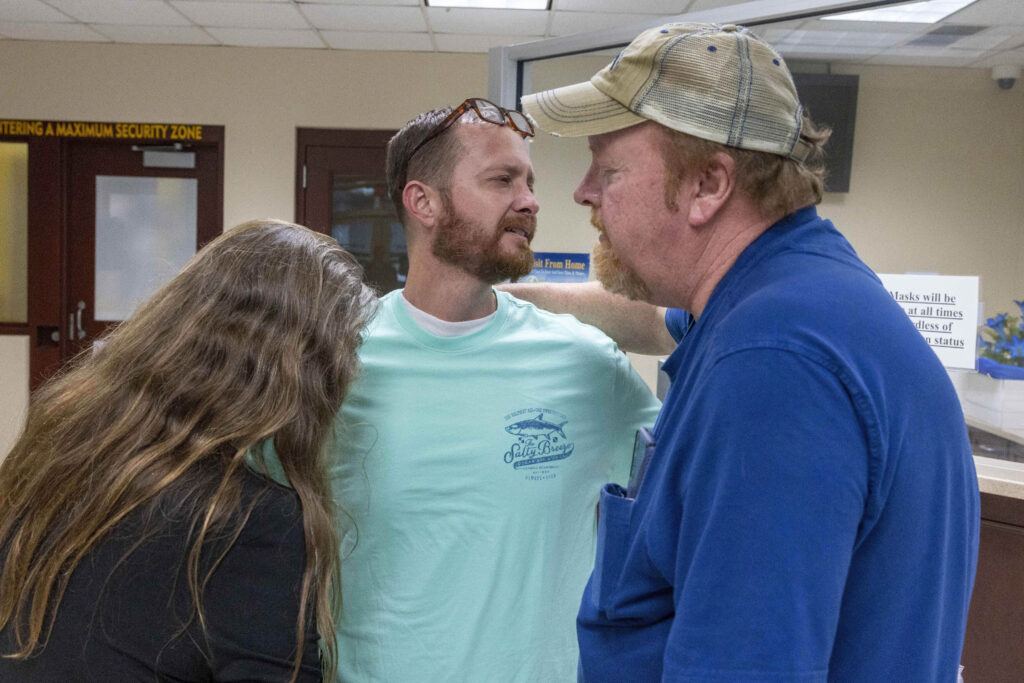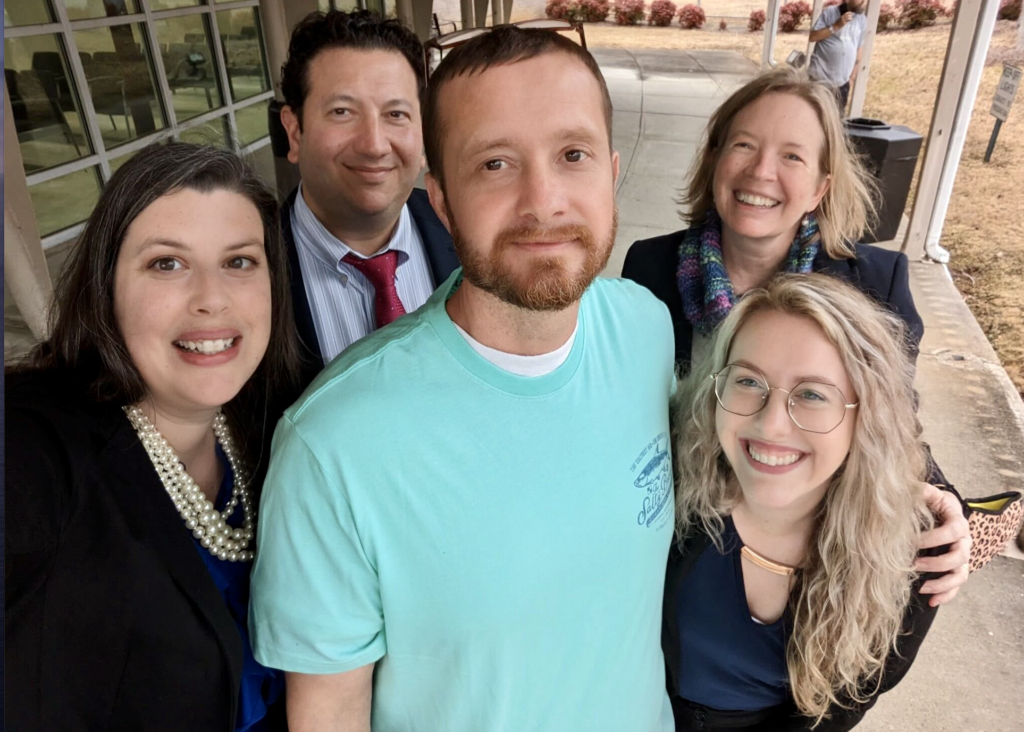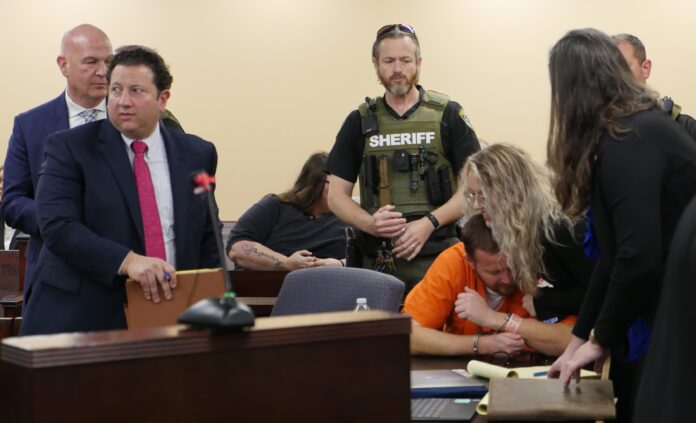
A Georgia man is now free and cleared of murder charges after fighting to prove his innocence for 22 years. Joey Watkins was exonerated on Sept. 21 in Floyd County, and a Mercer Law School professor and two students are part of the defense team that worked to free him.
In 2001, Watkins, 20, was sentenced to life in prison for the shooting death of 21-year-old Isaac Dawkins in Rome. The conviction came despite an alibi verified by cellphone records and several people, as well as no evidence linking him to the car identified in the shooting, according to the Georgia Innocence Project, a nonprofit law office specializing in post-conviction work on behalf of wrongfully convicted people. The Georgia Innocence Project got involved in Watkins’s case around 2014.
Meagan Hurley, a 2019 Mercer Law School graduate, joined Watkins’s legal team as an attorney with the Georgia Innocence Project and continued her involvement when she took over the school’s Habeas Project clinic this summer. Pro-bono lawyers Ben Goldberg and Noah Pines, along with Georgia Innocence Project’s Christina Cribbs, also serve as co-counsel for Watkins.
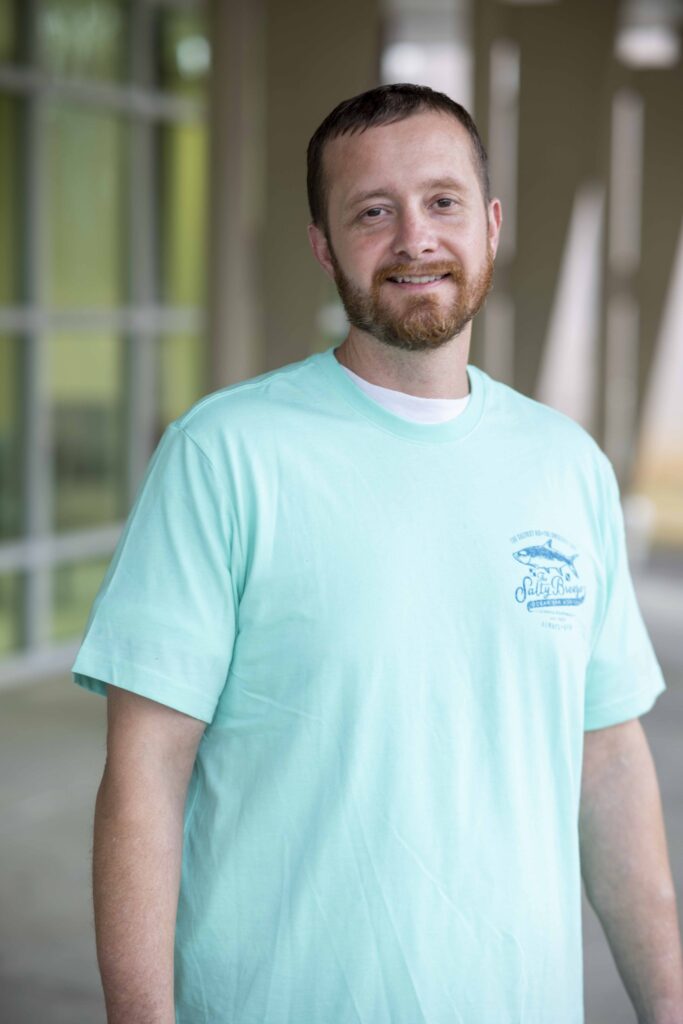
The Habeas Project, established in 2006, allows third-year law students to work with clients on cases under close faculty supervision, and students Daniel Farnham and Eesha Kumar assisted Hurley with research on Watkins’s case. The clinic focuses on post-conviction proceedings, through which a prisoner can present evidence of constitutional violations and other errors that may not have been shown during trial, such as evidence of innocence, misconduct or poor lawyering.
“(Hurley) brought that case with her as a learning opportunity,” said Sarah Gerwig, Mercer Law professor and founder of the Habeas Project. “We agreed that this is exactly the type of case that we want students working on and handling. There’s fascinating cutting-edge legal issues. There are opportunities for students to make a difference. There’s co-counsel opportunities. We saw that as a win educationally, aside from the merits of the case.”
After numerous legal proceedings and setbacks, Watkins’s case gained national attention when crime podcast “Undisclosed” investigated it in 2016. Cellphone evidence was vital to proving Watkins’s innocence, but that evidence had formed the basis for claims in previous post-conviction proceedings and could not be re-litigated in a second habeas petition filed by Georgia Innocence Project, Hurley said.
Working with the Georgia Innocence Project, “Undisclosed” revealed juror misconduct related to the cellphone evidence as well as official misconduct in the 2001 trial, giving Watkins a pathway back to court. The Georgia Innocence Project filed a habeas petition based on this evidence that same year, but procedural barriers prevented the new evidence from being heard in court until spring 2022.
The presiding Superior Court judge ruled to grant habeas relief in April 2022, vacating Watkins’s 2001 conviction, but the attorney general’s office appealed that order to the Georgia Supreme Court. That court affirmed the order vacating Joey’s conviction in December, and he was released on bond in January. However, the district attorney moved forward with plans to retry Watkins for murder.
“I could tell at that habeas (proceeding) that there was a real possibility that I could win,” Watkins said in an interview with The Den on Oct. 3. “That changed my outlook. I knew that my case was strong.”
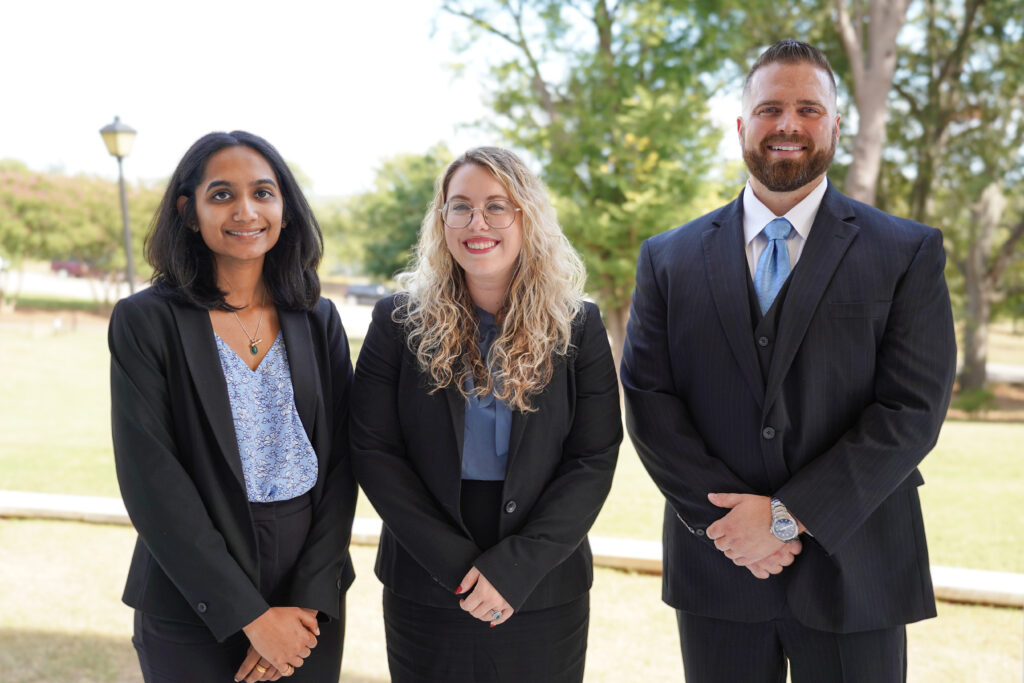
Law students Farnham and Kumar said they went through thousands of pages of notes and transcripts to get up to speed on the case, wrote legal memos, and connected the facts with their research to make sure the trial arguments would be coherent.
“Going through all the documents and files, you really could see that there was a pretty great miscarriage of justice there, and that Joey was objectively innocent of the charges and the conviction,” Farnham said.
Hurley said the students’ research would have been critically important in arguments for a retrial.
“We were actively preparing for a retrial that was supposed to happen in November. We would have been ready,” she said. “We have always believed that this is an actual innocence case. There’s cellphone records that show Joey couldn’t have been at the scene of the crime where Isaac Dawkins was murdered. The DA’s office … ultimately came to the conclusion that there’s no evidence to proceed to a retrial on. Two weeks ago, the DA’s office signed a document called a nolle prosequi that dismissed the charges against Joey, which resulted in his exoneration.”
Floyd County Superior Court Judge Bryan Johnson, a 2009 Mercer School of Law graduate, signed the notice of dismissal.
With Farnham and Kumar in her office at Mercer Law School, Hurley and her team called Watkins on Sept. 21 to tell him the good news.
“It was overwhelming. So many emotions were going through me. Words can’t describe. I wasn’t expecting (that call). The last few weeks, I’ve been really mentally preparing myself for trial,” said Watkins, who called his lawyers his heroes and biggest supporters. “It hasn’t completely set in with me that I’m free. It feels different. Just knowing in the back of my mind that I can actually do whatever I need to do or what I want to do — I’m grateful.”
Kumar, who wants to be a prosecutor, said it was surreal and humbling to be on that phone call.
“It definitely has been the most memorable moment in law school for me so far,” said Farnham, who wants to be a criminal defense attorney. “It was a pretty emotional moment, and I’m on the outside of it. I can’t imagine what that meant for Joey.”
Farnham said being involved in this case has shown him how lawyers have the opportunity and ability to completely change someone’s life. He has also realized the importance of pushing back when justice isn’t being done and clients aren’t being represented properly.
In wrongful conviction cases, the legal system has failed both the accused and the victim, Gerwig said. That’s why it’s so important for processes to be followed properly the first time.
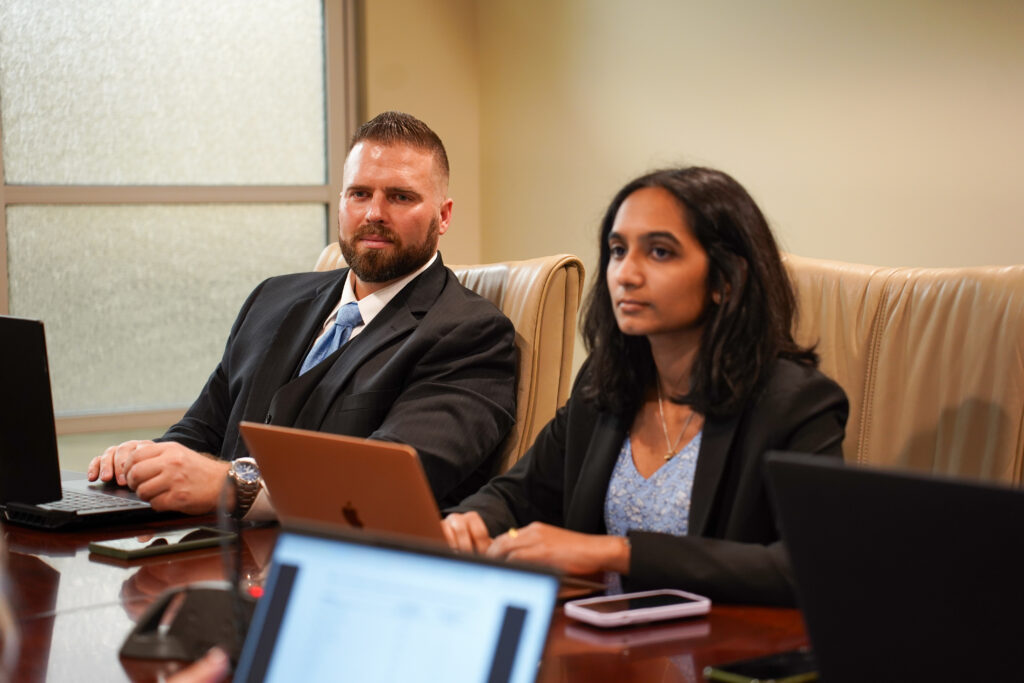
“This post-conviction work gives you a deeper understanding of the system you’re working in because not everything is black and white,” Kumar said. “A lot of things are, but when it comes down to it, it’s us against the system that we need to work to make it better.”
Watkins said the law students’ words and outlook are encouraging.
“If Eesha wants to be a prosecutor and she goes in with the correct mindframe, that could save lives,” he said. “That’s a little hope there in a realm of darkness. I’m grateful for that. That’s awesome.”
Seeing vindication in the court system is “joyous and triumphant,” and these law students will carry the lessons they’ve learned with them throughout their careers, Gerwig said.
“In post-conviction work, because the wins are so rare, you have to hold onto those wins and sometimes learn how to redefine a win,” Gerwig said. “This could be a part of helping a student stay with this post-conviction work in a dark time, when they wonder if their work is making a difference. Making a connection with a client, standing with a client and believing in them is good in and of itself.”
Hurley said Watkins’s ongoing case had a big impact on the direction of her legal career. She lived near Rome as a child and grew up hearing about the case, which spurred her to listen to the 2016 podcast and later apply for a Georgia Innocence Project internship and the Habeas Project clinic as a law student. She came into law school intending to be a public defender but discovered that she really liked post-conviction work.
“I am very grateful for the team and the community that we had working on Joey’s behalf, Joey included. He was very much a part of the team and an advocate for himself,” Hurley said. “I think he has taught us all probably way more than we could even begin to put into words. I’m just so proud of everything the students have done on this case and of Joey and our co-counsel. We’re absolutely thrilled that he is finally free. This was a travesty of justice from the beginning. It never should have taken as long as it did, but thankfully, we’re finally here, and I’m really eager to see all the amazing things that Joey goes on to do with his life.”
Watkins said that once he is adjusted and back on his feet, he hopes to travel and see the world. He taught himself to speak Spanish and Portuguese while in prison, and Brazil is at the top of his travel list. A talented musician, he’ll keep on playing guitar and writing music.
“Hopefully in the next three weeks or so, I’ll be able to put my feet in the sand and see the ocean,” he said. “I want to take off on Route 66 and see where it takes me — just travel, just be free.”
